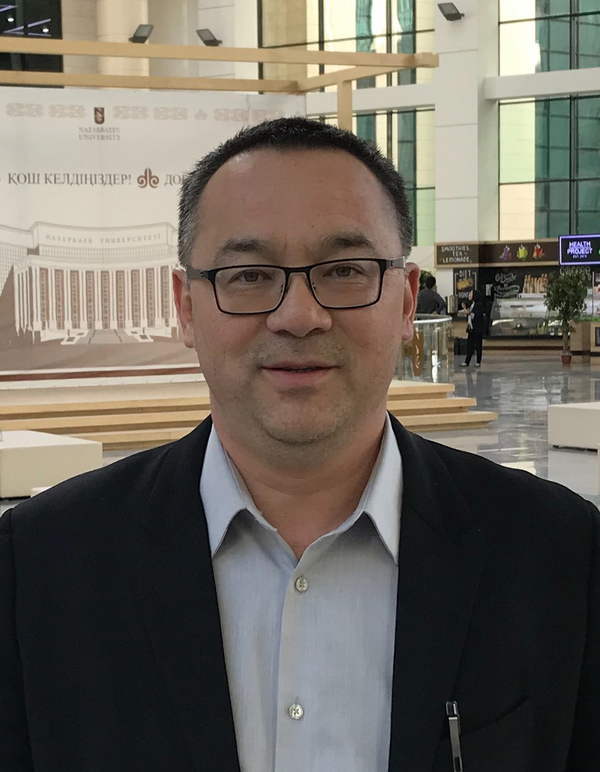
Cancer Center at Illinois Seminar
- Event Type
- Seminar/Symposium
- Sponsor
- Cancer Center at Illinois
- Location
- Beckman Institute, Room 3269
- Date
- Oct 4, 2023 12:00 - 1:00 pm
- Speaker
- Dos Djurmakhanbet Sarbassov
- Registration
- Registration
- Contact
- Tyler Wolpert
- wolpert1@illinois.edu
- Phone
- 217-300-1234
- Views
- 187
- Originating Calendar
- Cancer Center Events
Please note that registration is required.
Seminar Title
Defining the Nutrient-Dependent Nuclear Processes Mediating Cell Growth and Survival in Cancer CellsAbstract
Nutrients are essential for cell growth and survival. The nutrient-dependent nuclear processes controlling cell growth and survival are our two main research areas.- Project 1: How nutrients control assembly of ribosomes at nucleolar site remains poorly characterized. To address this problem, we isolated and characterized native mammalian preribosomal complexes. We show that formation of mammalian pre-ribosomes proceeds from an intermediate to assembled (composed) state of maturation. The functional studies indicate that the pre-ribosomal complexes are highly sensitive to amino acid deprivation or inhibition of a nutrient-dependent mechanistic target of rapamycin (mTOR) signaling.
- Project 2: Accelerated growth of cancer cells sets a distinct metabolic surge that drives elevated glycolytic consumption of glucose by cancer cells defined as the Warburg effect. Screening of several cancer cell lines indicated that glucose starvation is highly cytotoxic for Kirsten rat sarcoma (KRAS) mutant cancer cells. We found that generation of reactive oxygen species (ROS) under glucose deprivation leads to a cytotoxic impact by inducing a pre-apoptotic nuclear condensation in cancer cells. Our studies indicate that ROS promote apoptosis by imposing the histone deacetylation and chromatin condensation mediated by the recruitment of an abundant chromatin repressive Nucleosome Remodeling Deacetylase (NuRD) complex to chromatin. We demonstrate that the oxidizing compounds are effective to mimic a glucose-dependent nuclear condensation in KRAS mutant cancer cell by inducing a nuclear condensation and priming the cancer cells for apoptotic cell death. This finding led us to development of a potent and promising drug combination targeting KRAS mutant cancer cells.
Speaker
Dos Djurmakhanbet Sarbassov
Professor, Department of Biology
Nazarbayev University, Astana (Kazakhstan)Prof. Dos Djurmakhanbet Sarbassov received his B.S. degree in biology from Kazakh National University, Almaty, Kazakhstan, in 1991, and Ph.D. degree in biochemistry and molecular biology from the University of Arkansas for Medical Sciences, Little Rock, AR, USA, in 1997. He was a postdoctoral associate and then a research scientist at the Whitehead Institute for Biomedical Research (affiliated with Massachusetts Institute of Technology), Cambridge, MA, USA, from 1999 to 2006. He joined the Department of Molecular and Cellular Oncology at the University of Texas MD Anderson Cancer Center, Houston, TX, as a faculty member in 2006. In 2019, he became a Professor of Biology at Nazarbayev University, Astana, Kazakhstan. Currently, he is the Director of the National Laboratory Astana and Vice Dean for Research (STEM) in the School of Sciences and Humanities. His main research interest is the nutrient-dependent regulations of cell growth and survival including their deregulation in cancer. His studies contributed to understanding of the essential mechanistic target of rapamycin pathway controlling cell growth in all eukaryotes.
Dr. Sarbassov received the Anna Fuller Fund Fellowship in Molecular Oncology, Massachusetts Institute of Technology, Cambridge, Massachusetts, USA, in 2000. In 2007, he became an MD Anderson Research Trust Fellow at the University of Texas MD Anderson Cancer Center, Houston, TX, USA.